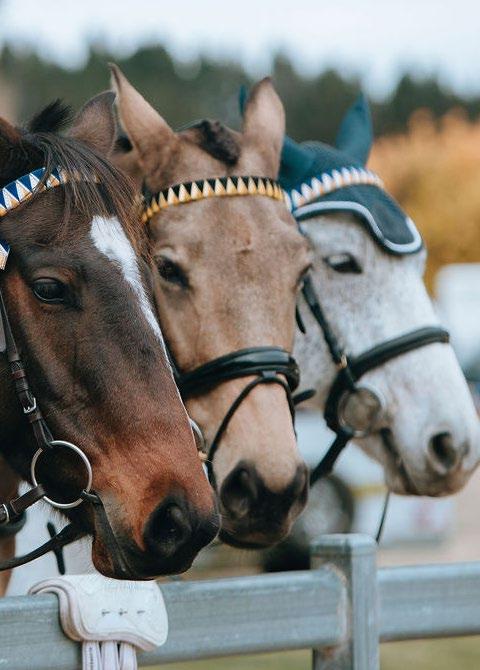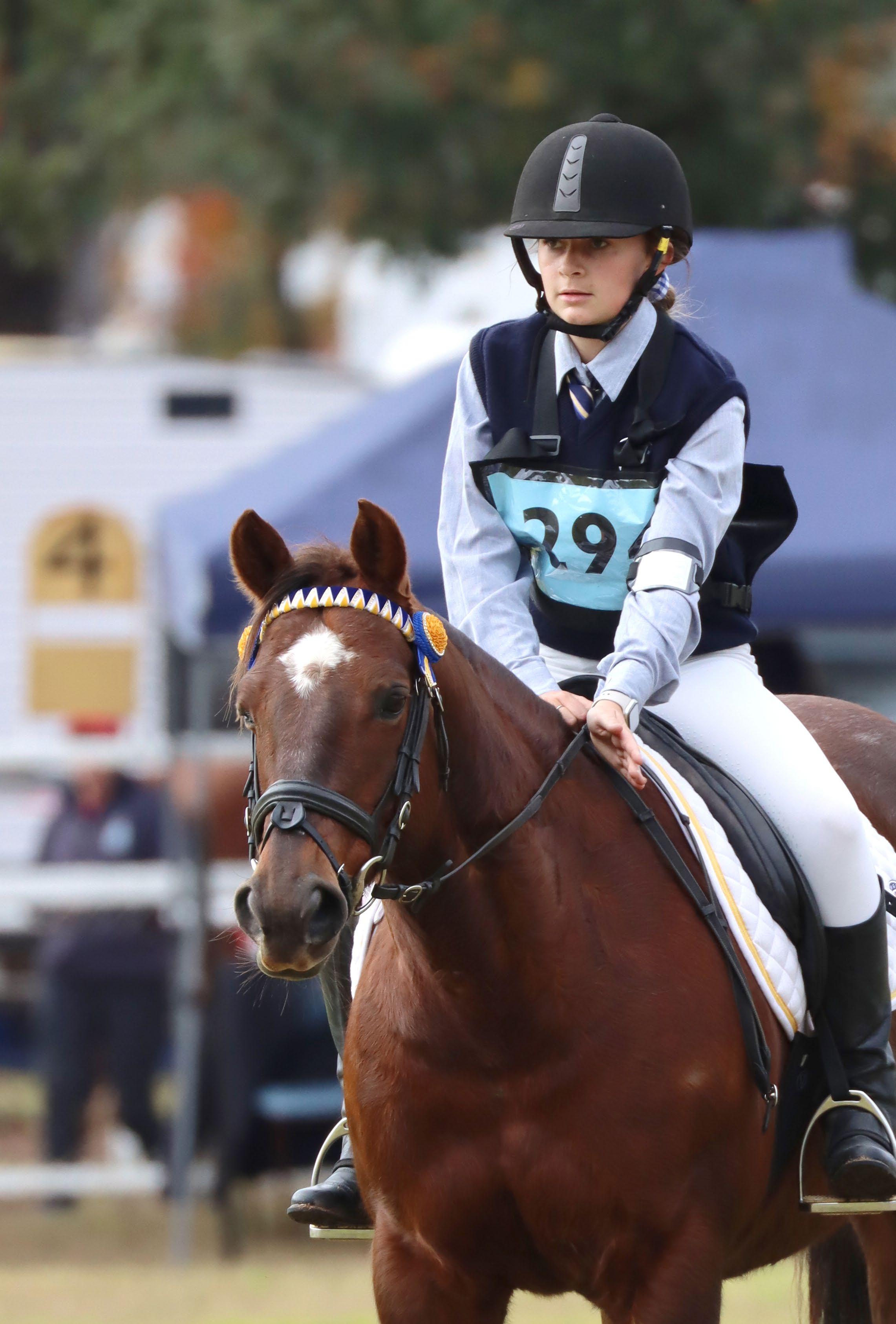

Welcome From the Principal, Dr Andrew Bell
Welcome to the Snowy Mountains Grammar School Equestrian Program. We are proud to have offered equestrian as a school sport for over 25 years, providing students with a unique opportunity to seamlessly combine their academic studies with their passion for riding. Our program features a variety of disciplines to choose from, including the Olympic disciplines of Dressage, Cross-Country and Show Jumping. We also warmly welcome beginners, guiding them through essential handling procedures before progressing in groundwork and flatwork, all the way through to development as advanced riders competing at higher level competitions nationally if that is a chosen path.
In response to growing student interest, we have introduced the Equestrian Academy (EDA) in recent years. This program is designed for riders who want to take their knowledge and skills in equestrian sports to the next level.
Participants benefit from weekly coaching by experienced and respected professionals over an extended period of time. While the EDA is aimed for
those students with some prior knowledge and skills, it accommodates a wide range of riding levels, making it an excellent opportunity for all aspiring equestrians.
Additionally, we offer an agistment facility conveniently located just minutes from campus, near the Pony Club, allowing you to keep your horse nearby and providing easy access to weekly lessons. For our boarding students, we provide convenient transport for you to access your horse during term time.
If you are interested in joining the Equestrian Program at Snowy Mountains Grammar School, we encourage you to speak to our Director of Sport or EDA Program Coordinator for more detailed information and to continue to read this Handbook for key insights into our program.
We look forward to welcoming you to our vibrant equestrian community.
Dr Andrew Bell Principal
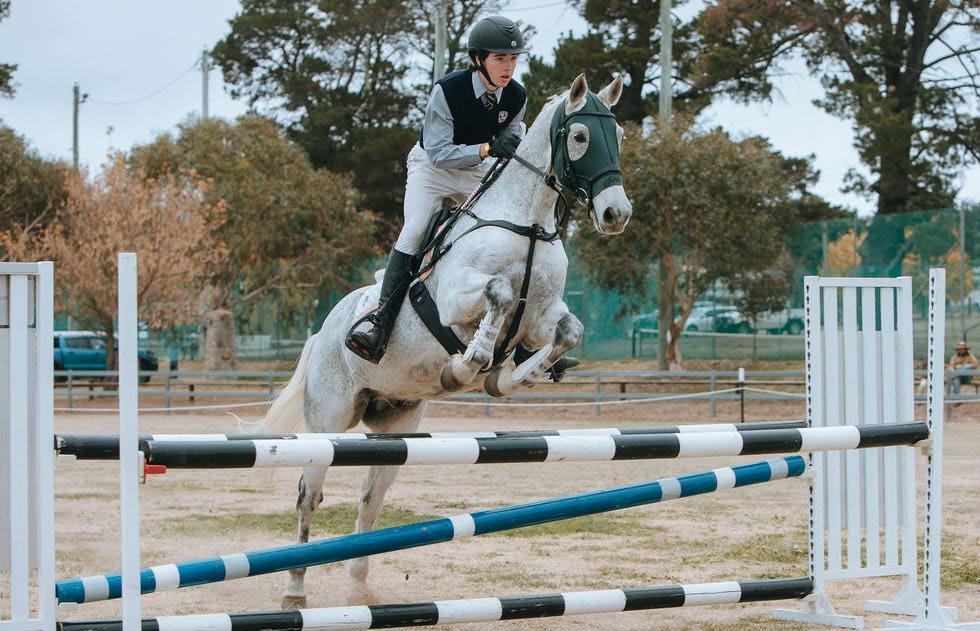
Photo Credit: Breanna A Photography
Meet Our Team
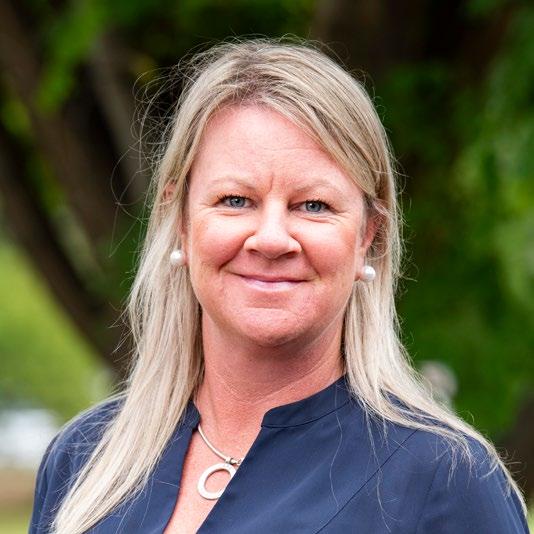
Director of Sport – Mrs Sally Bourke
Sally holds a Bachelor of Physical Education and serves as the Director of Sport at Snowy Mountains Grammar School. She oversees a diverse range of sport programs, ensuring every student has the chance to explore and excel in their chosen sports. With a background in Softball, Hockey, Swimming and Diving, her passion for sports runs deep. Sally stays active herself, playing in the Tuesday night Jindabyne Netball competition and skiing during Winter.
In her role, Sally is dedicated to creating an environment where students feel encouraged to try new sports and develop their skills across a variety of sporting disciplines. Sally organises events and ensures that each program reflects SMGS’s core values and goals, inspiring students to pursue excellence and find joy in their athletic pursuits.
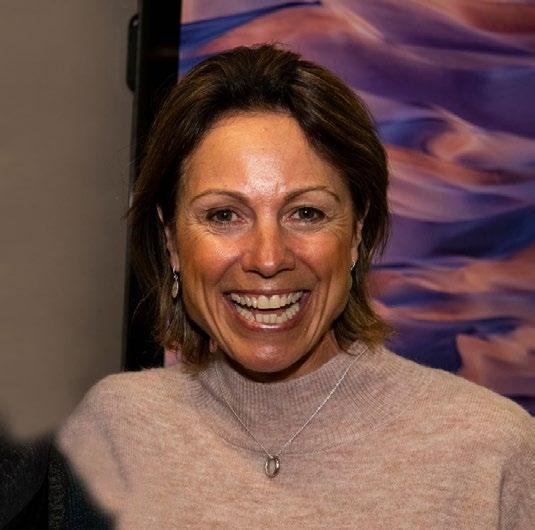
EDA Program Coordinator – Catherine (Gidge) Fairfield-Smith
Catherine returns as the Equestrian Development Co-ordinator and will continue as the first point of contact for all SMGS equestrian enquiries.
Having grown up on Comara Stock Horse Stud on the Liverpool Plains near Quirindi in north-west NSW, Catherine brings a wealth of equestrian experience to the role. As a long-time instructor in the SMGS equestrian program for over ten years, we are thrilled to have her further enrich the program and enhance the experience for our student-athletes.
“The Equestrian Academy is such a wonderful opportunity for students to be educated by high-level instructors without having to travel long distances. We cater for all levels of riding from beginners to advanced riders, whilst also including a large range of disciplines. There are so many options within the equine industry and we are here to assist students in finding their passion.”
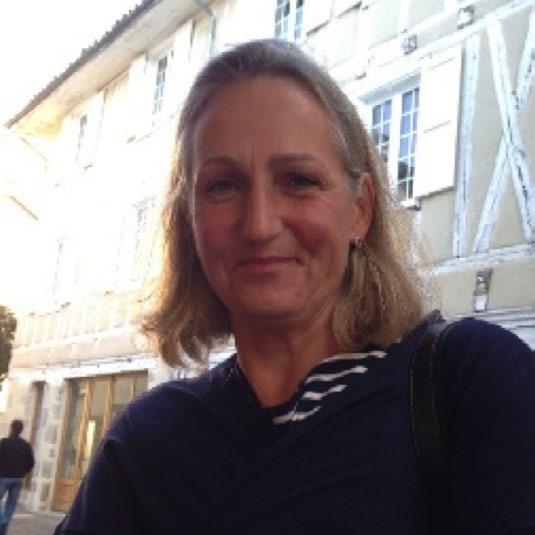
EDA Coach – Sarah Woodhouse
Sarah grew up on a bustling working farm in Norfolk, England, where she was surrounded by horses and the local West Norfolk Hunt. She started riding young, often going hunting with her mother. Her Hunt Master’s high standards meant Sarah always kept her ponies well-mannered and well-fed. She soon moved into point-topoints and Eventing, where she found her true passion in the mix of challenges and disciplines and the special bond it creates with her horses.
With coaching from top trainer and rider Ruth McMullen, Sarah competed for the Under 21s Junior European Team and represented her country in two Junior Championships. After finishing university, she moved to Australia to work on a sheep farm.
For over 30 years, Sarah has been a dedicated coach at Pony Club at local, state and national levels and served as Chief Instructor for NSW. Sarah’s enthusiasm for coaching shines through in her approach: “Coaching riders is my escape from the sheep work. I absolutely love it. Helping to build a rider’s confidence and connection with such a wonderful animal is incredibly rewarding,” she says. Her goal is to make young riders feel safe, excited and confident about their time with horses.
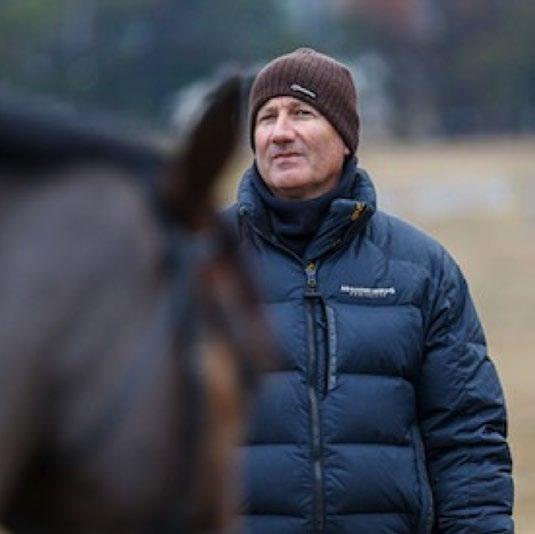
EDA Coach – Ben Netterfield
Ben grew up on a sheep and cattle property in North-West Queensland, working with horses from a young age. He started with mustering, then moved into Camp Drafting and expanded his passion to Dressage, Show Jumping and Eventing. Ben represented the Pony Club Queensland team in multiple disciplines and was the only young rider on the Dressage Queensland Squad.
Ben later moved to Sydney to work with equestrian legends, Rod Brown and George Sanna, producing show jumping horses for the international market. During this time, the Equestrian Bloodstock Agency of Australia (EBAA) at Chatham Park was a major exporter of performance horses to Asia and North America. After completing his coaching training, Ben focused on sharing his expertise with others. Following a major accident that sidelined him for a year, he pivoted to leadership and coaching, with a special focus on Trauma and Anxiety. His journey reflects a commitment to helping others overcome challenges and excel.
Ben’s impressive career includes:
• 1998: Assistant Coach and Stable Manager at the World Championships
• 2007: Coach for the Youth Olympics
• 2010-2013: Equestrian Australia National High-Performance Coordinator
• 2013: Trans-Tasman Team Manager/Coach for Senior and Junior teams
• 2013-2014: Completed Level 3 Coaching in Jump Training; coached in WA, Tasmania, Victoria and NSW State Squad clinics for Eventing and Jumping
• Ben has also competed at the World Cup level in Show Jumping, Medium Level Dressage and 2* level Eventing.
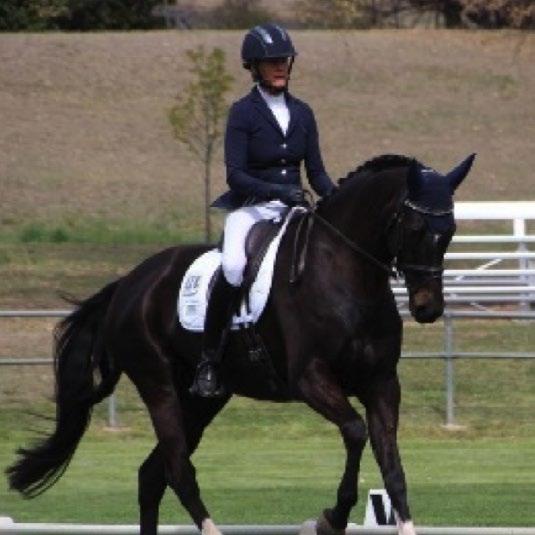
EDA Coach – Kim Kleven
Kim’s equestrian journey began on her family’s Monaro Plains property, where she grew up mustering sheep and cattle. During her Pony Club years, she represented Zone 18, Area 6 in Show Jumping, riding one of Peter ‘Skeety’ Evans’ showjumpers. After school, Kim explored Camp Drafting and Showing before discovering her passion in Dressage. In 2001, she trained in Switzerland with Olympic trainer George Wahl and multi-Olympic Champion Christine Stückelberger, even getting lessons on a Grand Prix stallion. This experience inspired her to start coaching when she returned home.
Kim stays at the top of her game by training with Australia’s leading coaches and has ridden some standout horses, including Neversfelde Jinx, who won the 4-year-old class at the Concours de Dressage International (CDI) in Sydney in 2007. She is now competing with Neversfelde Jinx’s offspring, continuing her impressive career.
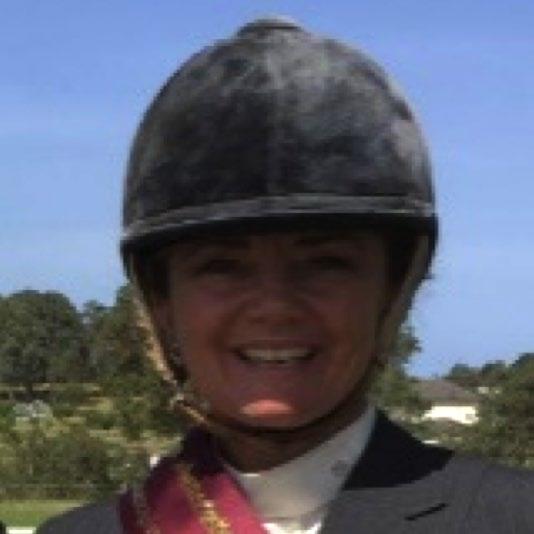
EDA Coach – Krista Mower
Krista started riding when she was 9 years old by trying to break in her family’s Shetland colt. Her lifelong long love for working with horses quickly grew, leading her to compete at the National level in Dressage, Showing and other equestrian disciplines. Since 2003, Krista has been a valued part of the SMGS Equestrian Program. She currently enjoys helping beginner riders develop their skills and gain confidence on their equestrian journey.
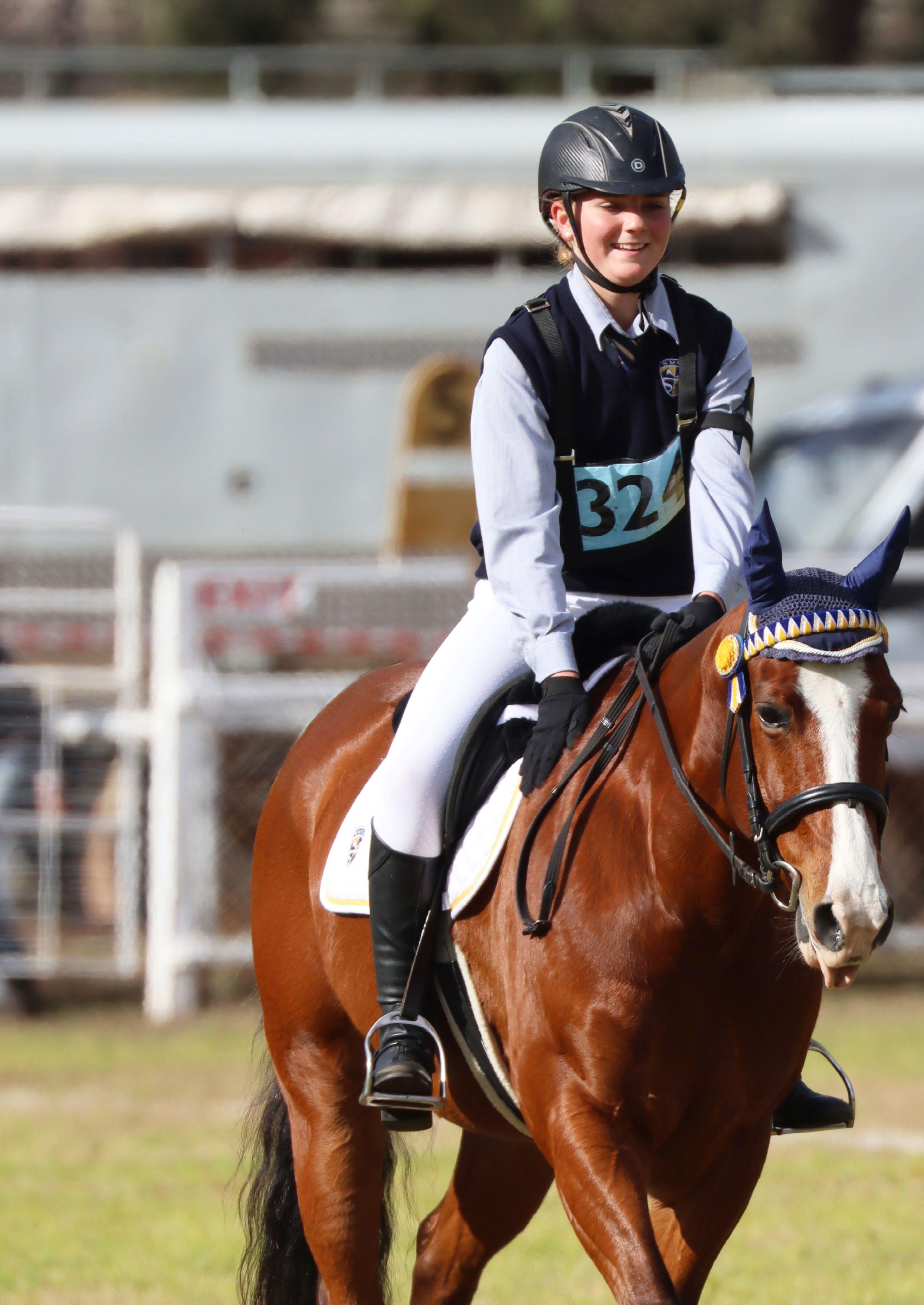
Communications
Maintaining regular communication is key to helping students and families feel supported and guided every step of the way. If you would like to discuss your child’s equestrian experience or share any thoughts on how we can enhance our program, please reach out to our EDA Program Coordinator.
There are support structures in place for students participating in the Equestrian Program who may be absent from school for certain periods of time. Students and parents/carers receive regular updates on the program’s schedule and any changes through the Messenger App. This keeps parents/carers informed about their child’s whereabouts and daily activities.
School Contact Details
Snowy Mountains Grammar School 6339 Kosciuszko Road Jindabyne NSW 2627
School Reception 8:30 am - 4:30 pm 02 6457 1022
School Website www.smgs.nsw.edu.au
School Email info@smgs.nsw.edu.au
SMGS Instagram @snowymountainsgrammarschool
SMGS Facebook @snowymountainsgrammarschool
SMGS YouTube @snowymountainsgrammarschoo2038
SMGS LinkedIn
@snowymountainsgrammarschool
Key Contacts
General Enquiries
Mrs Sally Bourke - Director of Sport (02) 64571022 sally.bourke@smgs.nsw.edu.au
Program-specific Enquiries
Catherine Fairfield-Smith - EDA Program Coordinator equestrian@smgs.nsw.edu.au
Program Aims
Our Equestrian Programs offer:
1. Skill Development Across Levels: Provides tailored coaching that helps students at all levels—beginner, intermediate and advanced—develop their riding and horsemanship skills progressively.
2. Safety and Horsemanship: Emphasise the importance of safety in all aspects of equestrian activities, teaching proper horse care, handling and riding techniques that promote responsible and confident horsemanship.
3. Personal Growth and Confidence: Encourages personal growth, resilience and self-confidence in students by setting challenging yet achievable goals, allowing them to experience success and build a strong sense of achievement.
4. Competitive and Recreational Pathways: Offers both competitive and recreational pathways to accommodate the diverse interests of students, from those seeking to participate in local or regional Equestrian competitions to those interested in riding for leisure and personal development.
5. Teamwork and Community: Fosters a sense of teamwork, camaraderie and mutual respect among riders, promoting a supportive environment where students can learn from one another and celebrate collective achievements.
6. Connection with Nature: Cultivates an appreciation for nature and the outdoors by encouraging a respectful and harmonious relationship with horses and the environment.
7. Equestrian Knowledge and Care: Equips students with comprehensive Equestrian knowledge, including horse care, stable management and understanding equine behaviour to build responsible and knowledgeable riders.
8. Holistic Development: Supports the holistic development of students by integrating physical, mental and emotional aspects of learning, fostering patience, focus and problem-solving skills.
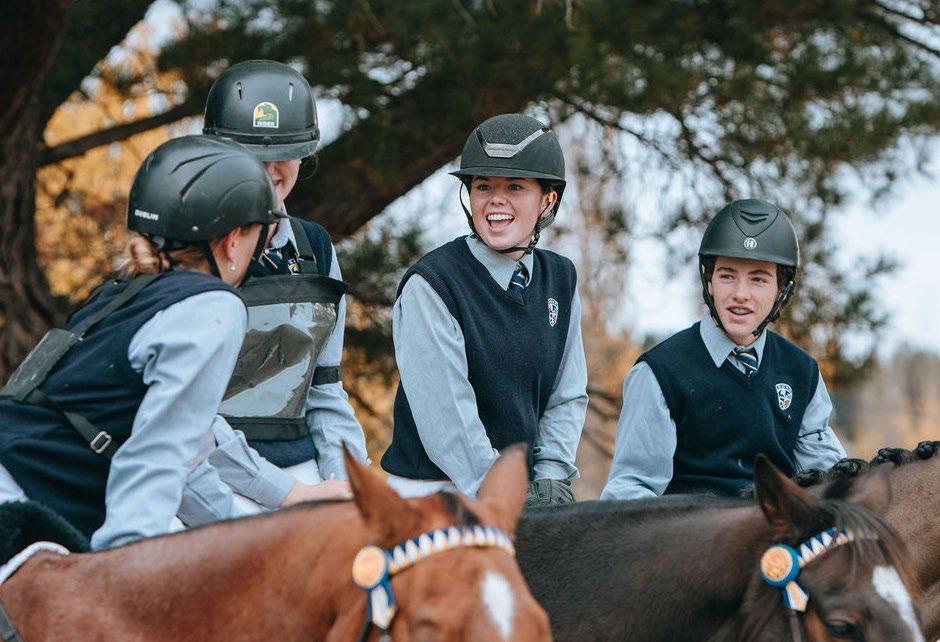
Photo Credit: Breanna A Photography
Program Overview
Our EDA Program offers coaching to suit all students’ needs. When your child joins the EDA, they will be placed in a group, program and team. These may change during the term based on what the EDA Program Coordinator and coaches decide.
Placements consider factors like:
• Rider skill level
• Horse’s ability
We will find the best fit to help each rider and horse thrive.
Learn to Ride Program
• Training: Every Wednesday during term from 1:30 pm to 3:30 pm, regular Wednesday Sport offering
• Rider Skill Level: This program caters for students who have never ridden to students who are fine tuning their skills and gaining confidence with their horses
• Skills Developed: During the Learn to Ride program, students develop the fundamentals of horsemanship:
• Care of horse including common ailments and feeding
• Equipment uses, fit and maintenance
• Safe horse handling
• Basic riding skills emphasising the safety of horse and rider
• Learning to ride in groups safely as well as independently
The Learn to Ride program is tailored to the individual needs of each rider and encourages riders to form positive relationships with their horses while learning and developing lifelong horsemanship skills.
Specialist Instructor Program
This is a multi-discipline program taking place on Wednesdays with visiting Specialist Instructors. It includes a 2-hour small group training session between 8:30 am and 4:00 pm. Additional training opportunities on Wednesday may also be available.
Groundwork, Flatwork and Dressage Team
• Training: On designated Wednesdays, Kim Kleven leads a 2-hour session
• Rider Skill Level: Ideal for riders who are building their skills or already experienced
• Skills Developed: Strengthen the bond between rider and horse, practise groundwork like lunging and pole work and understand horse movement and how this affects riding, gain tools to boost confidence for Dressage competitions and have the chance to try a musical ride, focusing on speed control and consistency
Jumping Team
• Training: On designated Wednesdays, Sarah Woodhouse leads a 2-hour session
• Rider Skill Level: Ideal for riders who are building proficiency or already skilled
• Skills Developed: Focus on rider position for jumping, for all other disciplines and while waiting for fences, core strength exercises for balance and confidence, riding straight into fences, understanding the canter and learning about horse biomechanics and vision –how these impact both jumping and flatwork
Compete with Confidence Team
• Training: On designated Wednesdays, Ben Netterfield leads a 2-hour session
• Rider Skill Level: Ideal for riders who are building their skills or already experienced
• Skills Developed: Build confidence in different riding situations, achieve personal goals with horses and in skill development, focus on effective warmups and enhance knowledge and confidence for competitions, aiming to tie all skills together for success in the competition ring
Program Timetable
Groups will alternate and start at different times each week. If a student has more than one horse and would like to participate in two sessions, this is possible.
In addition to Wednesday riding sessions, supervised riding is available after school between 3:50 pm and 5:20 pm on a Monday and Thursday, or a day that is suitable for both EDA Coordinator and riders, to consolidate the skills that have been learned.
Day Time
Monday 3:50 pm to 5:20 pm
Wednesday 8:30 am to 4:00 pm (includes a 2-hour small group session each Wednesday, depending on the time your group is allocated.)
Group 1/2: 9:00 am to 11:00 am
Group 3/4: 11:00 am to 1:00 pm
Group 5/6: 1:30 pm to 3:30 pm
Thursday 3:50 pm to 5:20 pm
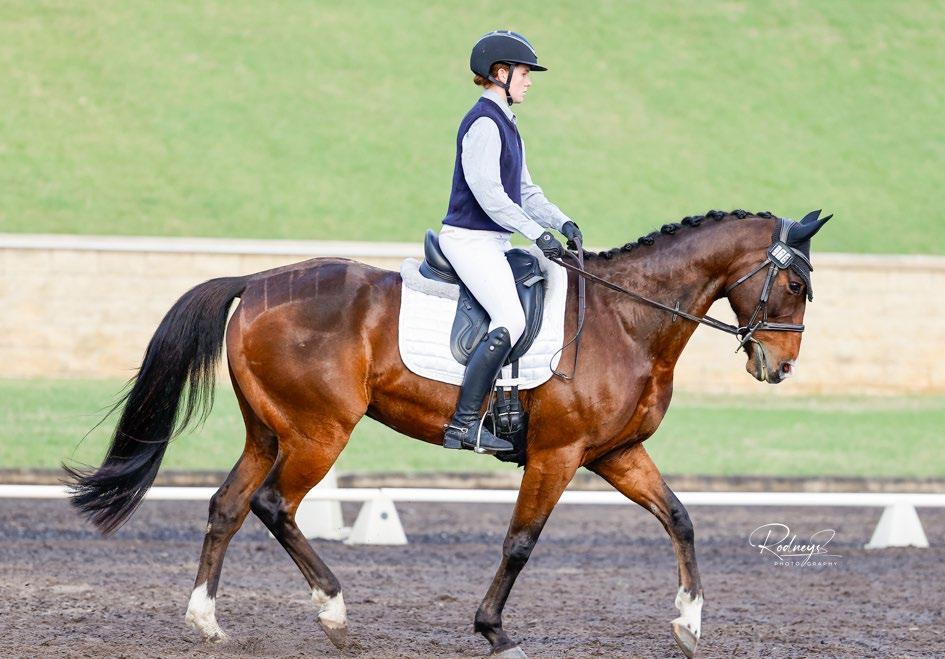
Photo Credit: Rodneys Photography
Facilities
Jindabyne Pony Club
The EDA Program takes place at the Jindabyne Pony Club (JPC), a purpose-built facility 5 minutes from SMGS. The venue incorporates Dressage arenas, a Jumping area and a Cross-country training Course, Round Yard and Holding/Day Yards.
Day and Boarding students can agist their own horses across the road from the Jindabyne Pony Club with approval. There are 10 individual paddocks available with constant water supply and trees for shade and shelter. All student’s who agist a horse must be a financial member of Jindabyne Pony Club.
Transport
Boarders are transported out to Jindabyne Pony Club each morning and afternoon to care for their horses. Students must sign in and out with the Boarding House at all times.
Transport is available for all students from SMGS to Jindabyne Pony Club for sessions each Wednesday.
Students must inform staff of their transport requirements each week.
8:30 am – Boarders are transported if they have a 9:00 am coaching session. All other students make their own way to JPC unless they have communicated prior with the Director of Sport.
10:30 am – Students are transported to JPC if they have an 11:00 am coaching session. They must sign out at G Block Administration.
11:00 am – Students who have finished their 11:00 am coaching session return to SMGS and must sign in at G Block Administration.
1:05 pm – Students are transported to JPC if they have a 1:30 pm coaching session. They must sign out at G Block Administration.
1:30 pm – Students who have finished their 1:30 pm coaching session return to SMGS and must sign in at G Block Administration.
3:45 pm – Boarding students are transported back to SMGS from JPC if they have an afternoon lesson.
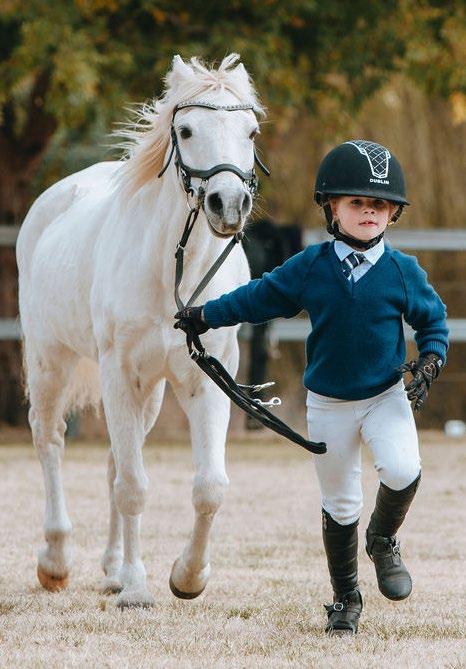
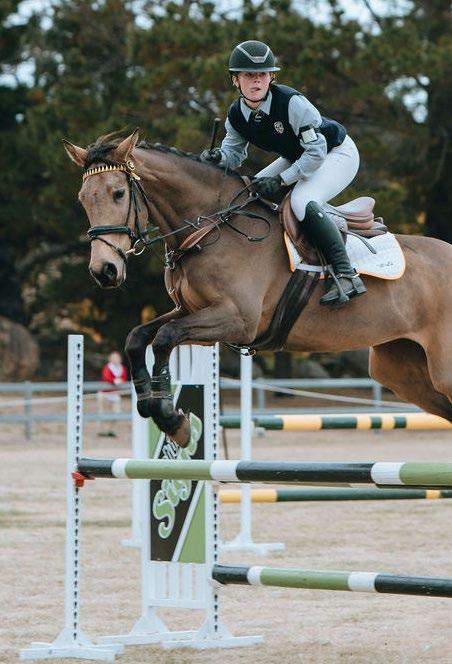
Photo Credit: Breanna A Photography
Photo Credit: Breanna A Photography
Student Safety
First Aid
Injuries can happen when riding and SMGS is wellprepared to respond. All our coaches and staff carry first aid kits and are trained to provide first aid.
Baseline Concussion Testing
There has been growing concern in sporting communities in Australia and internationally about the potential health ramifications for athletes from repeated head trauma (RHT) and sport-related concussion. Concussion affects athletes at all levels of sport, from the part time recreational athlete to the full time professional. If managed appropriately, most episodes of concussion resolve over a short period of time, with or without medical intervention. Complications can occur, however, including prolonged duration of symptoms and increased susceptibility to further injury. There is also concern about potential consequences of RHT for long term brain health.
Concussion symptoms and recovery times can differ greatly from person to person and the biggest risk is the
compounding effects of receiving another concussion before fully recovering from the first. A baseline concussion test helps medical staff understand what a fully recovered state looks like for each individual, providing a crucial reference point for better care.
Baseline Concussion Testing is strongly recommended for all riders in our EDA Program.
Early in Term 1, SMGS facilitates a Baseline Concussion Testing through Elevate Physio, a Complete Concussions provider in Jindabyne.
Personal Health and Hygiene
Before leaving JPC, students must:
• wash/sterilise hands thoroughly
• clean off shoes if necessary and remove any excess hay etc. before returning to the Boarding House or the classroom.
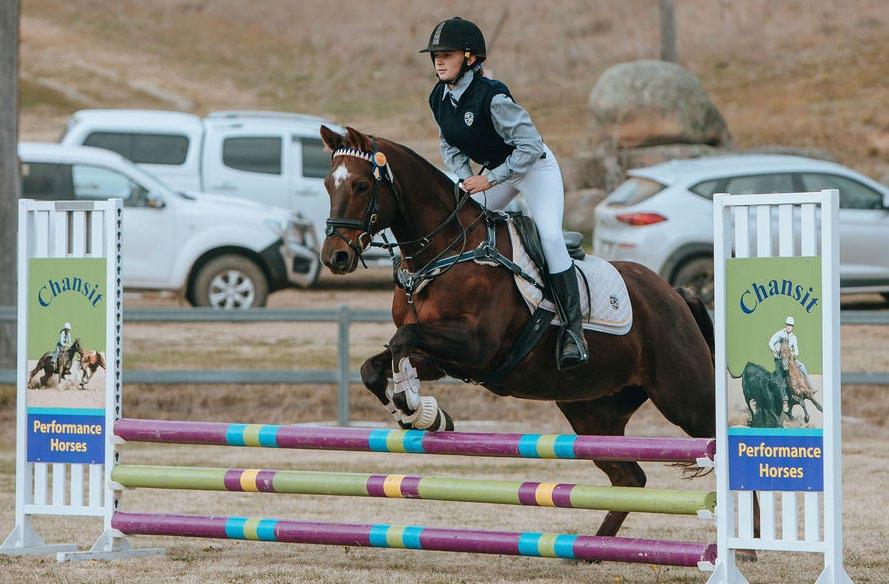
Photo Credit: Breanna A Photography
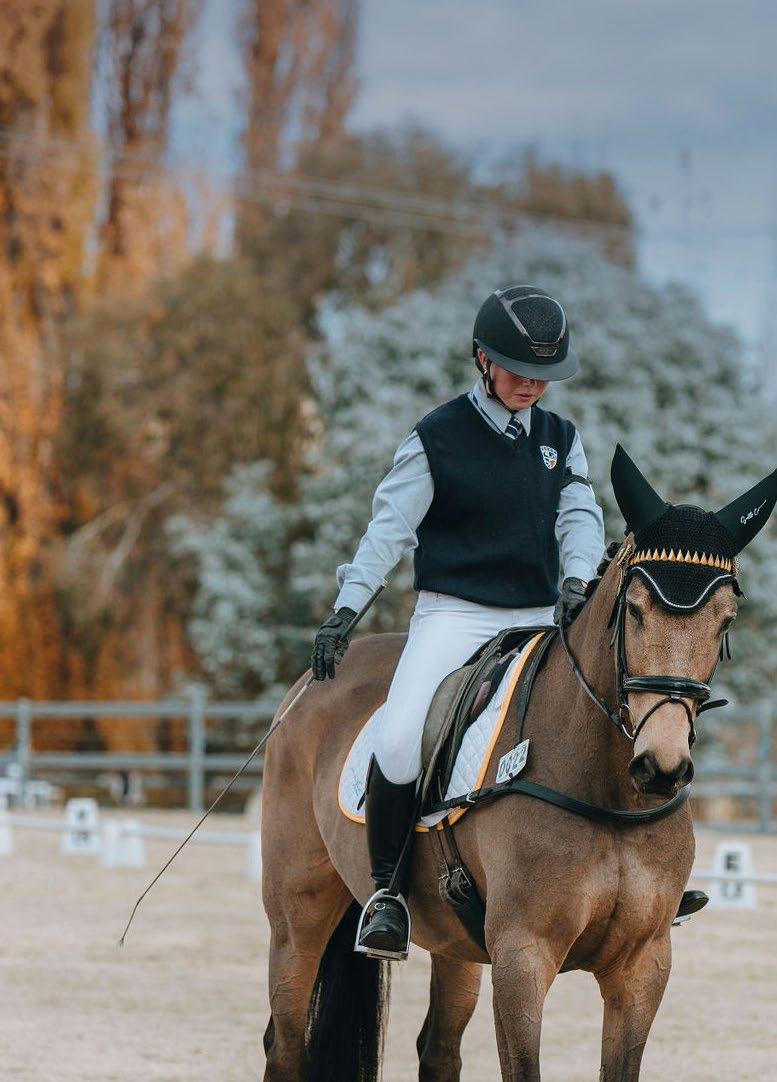
Horse Health and Care
Basic Health Check
All EDA students need to check their horses to make sure they are in good health.
All agisting students are required to check their horses twice per day (before 8:30 am and after 3:45 pm).
Students must check:
• Eyes, nose and mouth should be clean and free of mucus
• Check legs for swelling, blood or any issues
• Make sure the horse is moving well and not limping
• All feed has been eaten
• Horse should be bright and alert
• Droppings should look normal in consistency and amount
• Hooves need to be cleaned out
If students observe anything unusual about their horse’s health or behaviour, they must report it to the EDA Program Coordinator promptly and record it, as directed.
Feeding and Watering
• Horses are fed a hay ration (agreed on by student and EDA Program Coordinator based on available grass and workload) twice a day by students
• Feed must be kept in the lockable shipping container (away from rodents)
• Water must be checked each day and troughs cleaned at least weekly
Individual horse feeding regimes will be assessed, monitored and determined in consultation with the EDA Program Coordinator, if/when necessary.
Feed Orders: To avoid running out of hard feed, order 1014 days in advance.
Rugs
Make sure rugs fit properly and that there are no loose straps. Rugs should be adjusted according to the weather, in consultation with EDA staff.
Any issues or damage to equipment, including fences, must be reported to the EDA Program Coordinator promptly.
Leaving JPC
Prior to leaving JPC, students must ensure the following has been completed:
• Clean and tidy area/s used
• Packed away equipment and tack used
• Sign out as per procedure.
Competitions and Events
SMGS Equestrian Academy encourages riders to participate in at least two Interschools Competitions. The school will keep parents/carers and students updated with additional information about the competitions.
Competitions
SMIEC Gymkhana – Dalgety smiec.com.au
North West Equestrian Expo – Coonabarabran nwequestrianexpo.com.au
Global Entries globalentriesonline.com.au
Local Shows
Candelo Show
Nimmitabel Show
Cobargo Show
Bega Show
Delegate Show
Dalgety Show
Cooma Show
Bemboka Show
Date(s)
Saturday 3 – Sunday 4 May 2025
Friday 30 May – Tuesday 3 June 2025
Date(s)
Sunday 19 January 2025
Saturday 1 February 2025
Friday 7 – Sunday 9 February 2025
Friday 14 – Sunday 16 February 2025
Saturday 1 March 2025
Sunday 2 March 2025
Saturday 8 March 2025
Sunday 9 March 2025
Bombala Show Saturday 15 – Sunday 16 March 2025
Local Events for Pony Club Members
* Dates may be subject to change.
Throughout the year
Student Information
Uniform
At Jindabyne Pony Club
All EDA riders are expected to wear their SMGS gold PE polo shirt and SMGS polar fleece (weather dependent) with their riding attire while executing coaching sessions.
If students are riding/lunging or doing groundwork, they must wear jeans or jodhpurs with the SMGS polo shirt and a helmet. Appropriate boots must be worn and hair must be tied back.
At Jindabyne Pony Club Agistment Paddocks
When visiting the JPC Agistment Paddocks to feed horses, students must be dressed appropriately in short or long sleeve shirts. School uniform is permitted to do minimal duties. Students must also wear closed in leather shoes or gumboots at all times.
At Competitions and Events
At competitions, students must wear the formal SMGS Riding uniform. These can be purchased from the SMGS Uniform shop or Hip Pocket Cooma.
• SMGS EDA Chambray shirt
• SMGS tie
• SMGS jumper/vest
• White jodhpurs
• White saddle pad with SMGS logo
• School coloured brow band when hacking
Tack and Equipment
Students are responsible for their own tack and equipment. These should be clearly labelled with the student’s name. Tack and equipment must be free of defect.
Students should have the following equipment available to them at a minimum:
• Saddle and Girth
• Bridle with reins
• Helmet
• Boots
• Saddle Pad and Grooming Kit
• Buckets for feeding (2)
• Halter and Lead
• Lunge Lead
• Rugs (Summer and Winter)
• Basic horse First Aid Kit
• X-Country Vest (must be worn at all times on XC course)
Students are welcome to bring any other suitable tack and equipment that is appropriate to their coaching sessions.
Code of Conduct
Our school’s Equestrian Program is designed to provide a safe, respectful and supportive environment for students, staff, volunteers and horses. By participating in the program, all members agree to uphold the following guidelines:
Treat all horses with kindness and respect
• Ensure the proper care and maintenance of horses at all times.
• Never engage in any behaviour that could harm or endanger a horse, including inappropriate handling, overworking or neglecting the horse’s needs.
Respect for Others
• Show respect and courtesy to instructors, staff, volunteers and fellow riders at all times.
• Encourage a positive atmosphere of teamwork, patience and learning.
• Refrain from any form of bullying, teasing or discriminatory behaviour.
• Listen carefully and follow all instructions provided by coaches and staff members for your safety and the wellbeing of others.
Safety
• Wear appropriate safety gear, including helmets, boots and protective clothing, as required.
• Follow all safety guidelines and regulations while handling, riding or caring for horses.
• Report any accidents, injuries or unsafe situations to an instructor immediately.
• Do not engage in reckless or dangerous behaviour that could endanger yourself, others or the horses.
Responsibility and Commitment
• Attend all training sessions and competitions on time, fully prepared to participate.
• Take responsibility for your personal equipment, as well as the care and preparation of the horses you are assigned to ride.
• Show commitment to learning and improving your skills, while being mindful of the safety and wellbeing of the horses.
Sportsmanship
• Display good sportsmanship skills
• Represent the school with pride and integrity during competitions and events.
• Treat coaches, competitors, officials and judges with respect and fairness.
Care for the Environment
• Ensure that all areas used for riding and horse care are kept clean and tidy.
• Dispose of waste materials, including manure, appropriately and in designated areas.
• Respect the natural environment and facilities, ensuring no damage is done to land, fences or equipment.
Pastoral Care
The EDA Program Coordinator will check in regularly with equestrian students and liaise between a student’s coach and parents/carers, ensuring all needs are met and concerns or issues are attended to. Assistance or modification of the programs can be arranged if needed.
Academic Care
Students who ride in the morning and are absent from class can use the Library during Wednesday Sport sessions to complete classwork.
It is the responsibility of students to ensure that all classwork is up to date and to proactively communicate with their teachers to address any missed work. This may be done either before or after their scheduled riding lesson.
Students are required to maintain or improve their personal academic standard. If a student consistently does not meet the required standard, they will be temporarily unable to attend sessions until they meet the standard.
Signing In and Out
EDA riders (Day and Boarding students) are required to follow the SMGS sign in and sign out procedure when departing/returning to SMGS at all times. This ensures all staff members are aware of a student’s location for safety and attendance reasons.
Local Hard Feed Suppliers
Mitre 10, Jindabyne (02) 6451 4200
Elders, Cooma (02) 6455 5500
South-East Rural Supplies, Cooma (02) 6452 3511
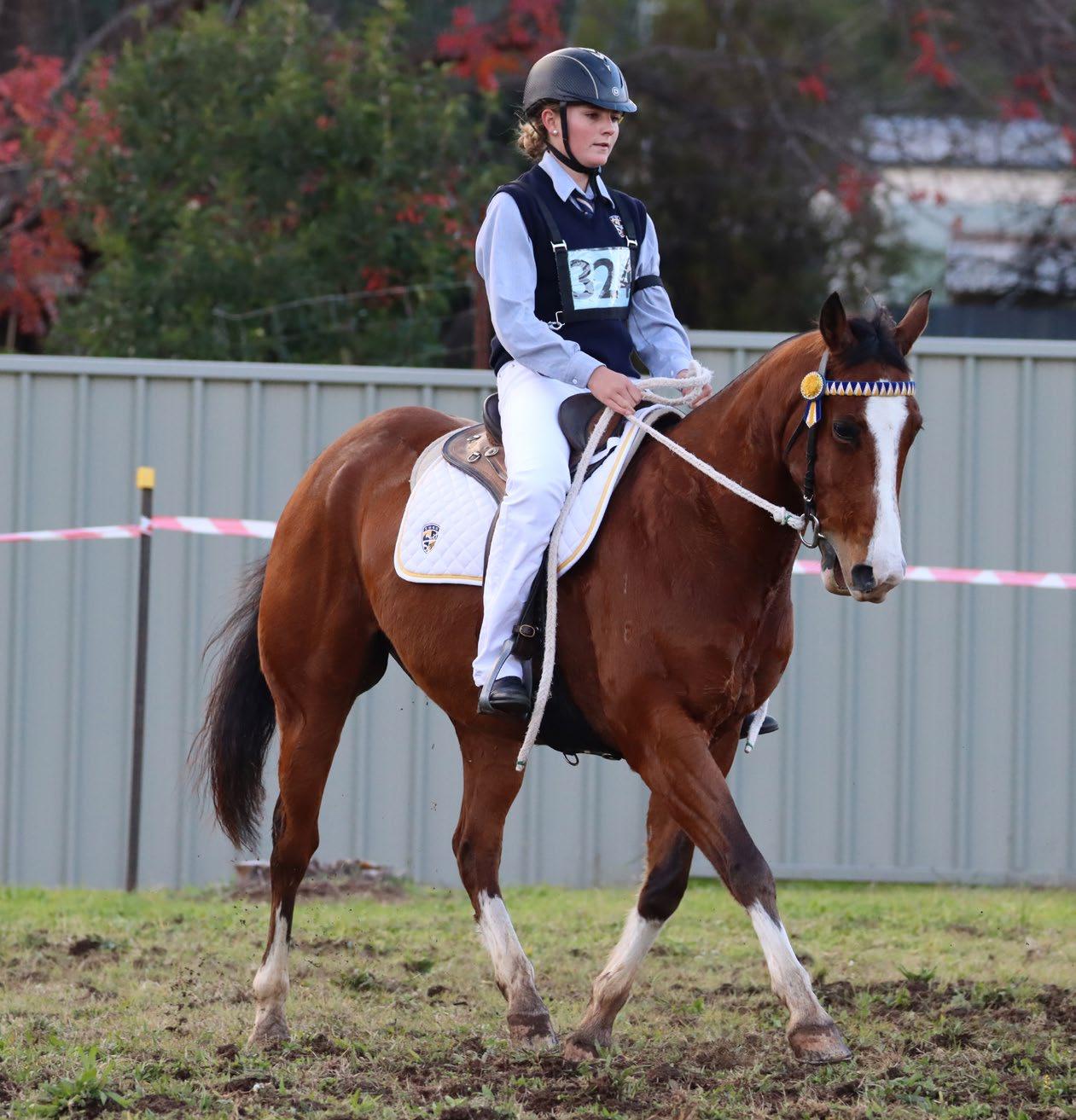
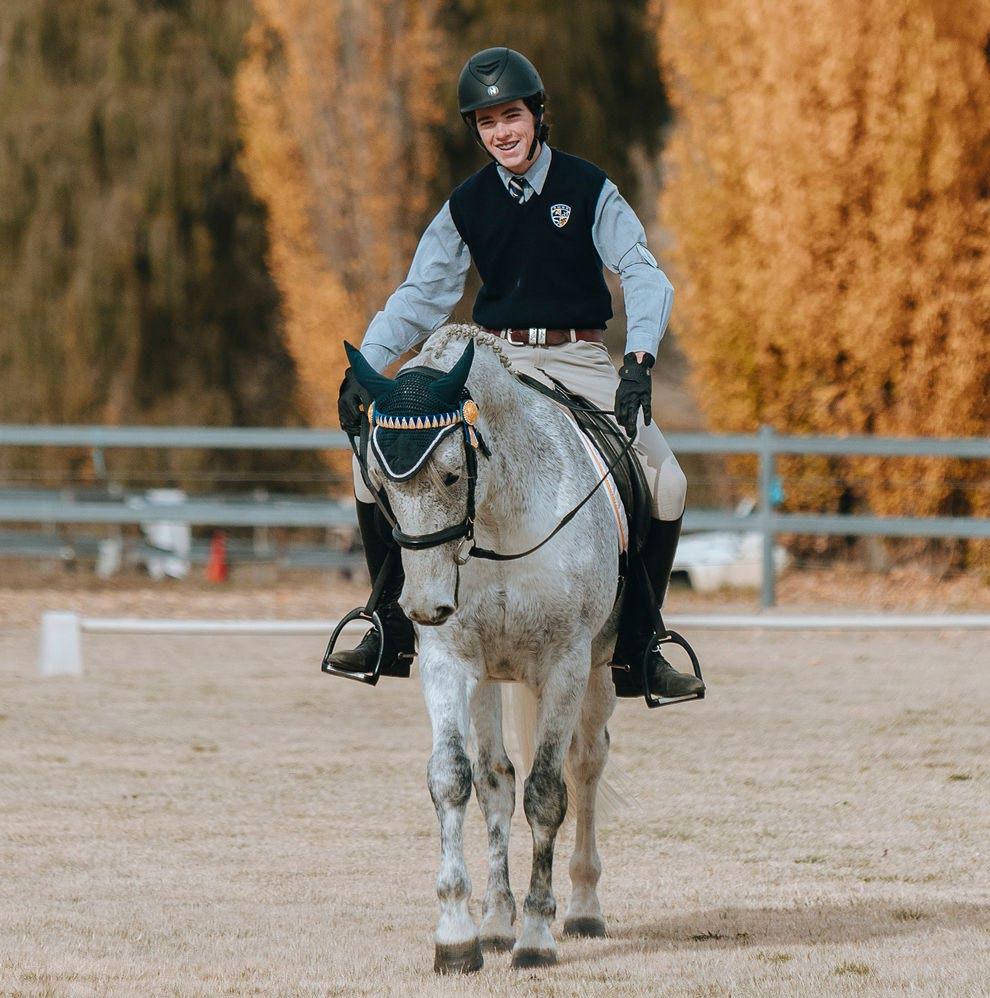
Photo Credit: Breanna
How to Apply
EDA Selection Criteria
All students who participate in the EDA Program must:
• Demonstrate a genuine interest and enthusiasm for equestrian activities, with a commitment to regular participation and improvement, regardless of skill level.
• Exhibit a positive attitude towards learning and show a desire to develop riding skills and equestrian knowledge. This applies to both beginner riders looking to establish a foundation and advanced riders aiming to refine their technique.
• Adhere to safety standards and show a commitment to the welfare of horses, following instructions for safe riding and horse care practices, including proper handling and grooming and stable management.
• Display a level of physical fitness and emotional resilience required for the demands of equestrian activities. This includes balance, coordination and a readiness to handle the challenges associated with riding at various levels.
• Demonstrate the ability to accept and act on constructive feedback from coaches and instructors, showing growth and improvement over time. This applies to all riders, from beginners to advanced competitors.
• Show respect for peers, coaches and horses and demonstrate an ability to work well within a team environment, contributing positively to the academy community.
• For intermediate and advanced riders, a proven track record of riding experience and participation in equestrian activities (training sessions, competitions, clinics) is required. Riders at this level should be able to demonstrate advanced control and handling skills.
• Show the ability to balance academic responsibilities with the demands of the Equestrian Academy. Students should maintain a good standing in their studies and other commitments.
Applications
To apply for the Equestrian Academy, students may be in Years 3 to Year 12 (upon discussion with Director of Sport). Parents/carers and their child/ren are asked to fill out the online form sent via Sentral notifications at the end of the previous term.
Download Application Form
Forms are to be completed once students are enrolled in EDA.
• Operoo Form for all EDA students to accept Waiver
• Microsoft Form for students with Agisted Horses –this will need to be filled out and returned to the EDA Program Coordinator prior to horses arriving at the Agistment Block.
Who is eligible to participate in the Equestrian Academy?
In order to participate in the program, the rider must:
• Be enrolled at SMGS as a permanent student and in Years 3-12 (Year 12 must seek approval from Director of Sport).
• Have communicated with the Equestrian Programs Coordinator and have had their application approved.
• Application is via the Application form in the previous term.
How old do I have to be to be a residential student at SMGS?
You must be in Year 7 or above to join the SMGS boarding house.
What is the cost of participation in the Equestrian Academy in 2024?
The Equestrian Academy costs are $95 per 2 hour riding session per horse. Agistment costs are $175 per term which includes site and feed costs (hay).
Do I need to have my own horse for the EDA Program?
Yes, your own horse is required if you wish to participate in the EDA Program. The EDA Coordinator may be able to assist in the organisation of a horse to loan/lease for the term.
When is payment for the program due?
For participants, the program will be invoiced on your regular Mid-Term statement.
Is there a cap on the number of program participants?
There is currently no cap on the number of riders participating in the EDA Program. All students of all abilities can be included in the EDA Program.
Is the program cost refundable in case of injury?
In the event that an athlete is unable to complete the program owing to an injury related to the program, which will prevent them re-entering the program before the end of the season, there will be NO refunds made.
Do EDA participants require private health insurance?
Yes. All EDA participants should have private health insurance of an appropriate level for the activity undertaken. Our students, while enrolled at the school, are also covered, through which parents/carers can claim some items. Cover commences when the student begins classes at the school. This insurance is ancillary to, and does not replace, private health insurance.
What does the fee cover?
The program/s fee covers:
• qualified and experienced coaches,
• transport to and from the Jindabyne Pony Club,
• SMGS supervising staff member/s during the program.
The program fees are additional to the scheduled SMGS school fees.
I’m already enrolled at SMGS; what are my costs?
Your additional costs will be rider safety equipment, horse and Baseline Concussion Testing (highly recommended for EDA riders).
How does the EDA Program work with the day school?
In order to maximise learning outcomes, EDA riders participate in as many lessons as possible within the normal day school timetable. Riders who miss classes are expected to attend the Library during Sport time and catch up on work missed during their timetabled Coaching session. Year 11 and 12 students and Learn to Ride students will attend their Coaching session during the allocated sport session so they do not miss classes.
What uniform items am I required to wear?
All EDA riders are expected to wear their SMGS gold PE polo shirt and SMGS polar fleece (weather dependent) with their riding attire while executing coaching sessions.
If students are riding/lunging or doing groundwork, they must wear jeans or jodhpurs with the SMGS polo shirt and a helmet. Appropriate boots must be worn.
At competitions, students will wear the formal SMGS Riding uniform which is included under the ‘Student Information’ component of the handbook. These can be purchased from the SMGS Uniform shop or Hip Pocket Cooma.
Do I need to compete in Equestrian events?
If you are a member of the EDA Program, it is encouraged that riders participate in at least two Interschools Competitions.
How does the EDA Program work with the Boarding House?
Residential EDA students will participate as far as possible in the normal boarding house timetable. Residential students will be supplied with packed meals rather than eating in-house, where their training timetable dictates. The Boarding House also provides transport to and from the SMGS Agistment paddocks for the students to feed and maintain their horse care regime.
How do I access teaching support when I am competing at other events?
Riders can access their work and contact their teachers from any location via our online Learner Management System, Canvas or via email. The EDA Program Coordinatoror and SMGS staff can provide an actual point of contact for riders while away at competitions.
Should I get Concussion Baseline Testing before the season?
Athletes are strongly encouraged to get Concussion Baseline Testing prior to the commencement of the term/year. Riders are able to organise a session for this at the beginning of the term/year with Elevate Physio using Baseline Testing. This is not included in the costs of the EDA Program.
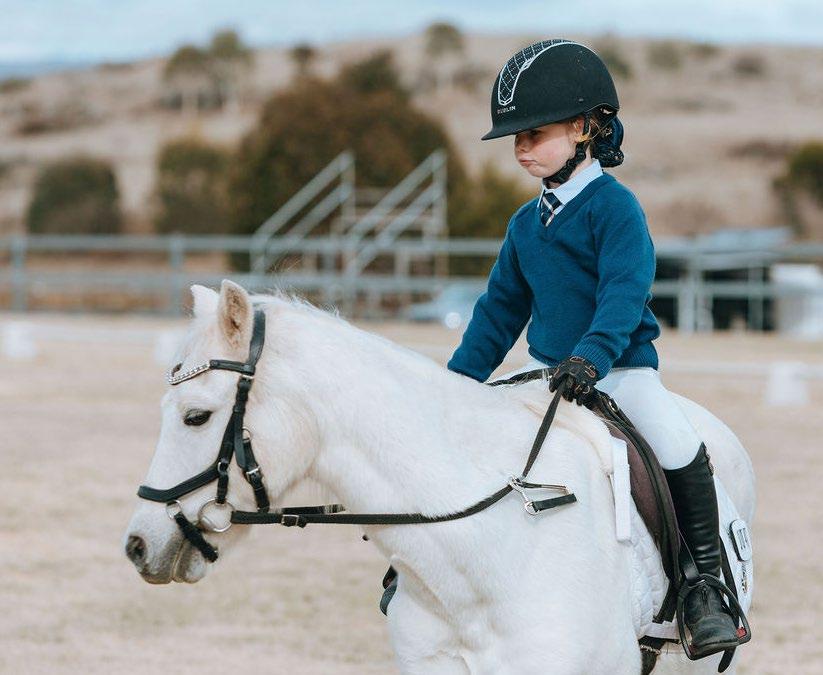
Photo Credit: Breanna A Photography
Success Stories
Zani Fairfield-Smith, Class of 2022
I came to SMGS in 2017 as a Year 7 student and was an active participant in the EDA Program throughout my time at school. It was a part of my week that I always looked forward to and it was amazing to watch the program grow into what it is today.
The team became a real community and created a great environment when we competed both at Interschools events and also the Open events. We built lasting relationships with our coaches and each other.
With a wide range of disciplines offered, the program definitely has something for everyone. The coaching that is offered led to my success at Interschool’s competitions, particularly at the North West Equestrian Expo in Coonabarabran and the State Interschool Championships, where I became the State champion in Eventing during my final year of school.
(Pictured left)
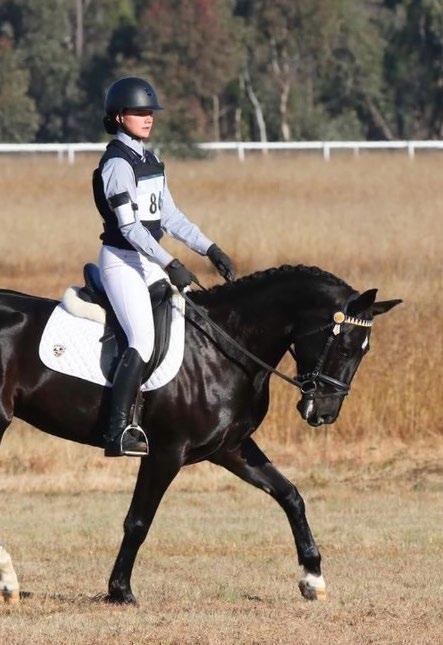
Josh May - Year 11, 2024
My equestrian journey began back in Year 1 when my parents introduced me to the sport. What started as a fun activity quickly became a passion that has grown over the years.
Over time, I’ve worked myself and several horses to perform the best we can in and out of competition. I’ve been fortunate enough to compete in some remarkable events. In 2023, I represented at the Pony Club Australia National Tetrathlon in Perth, a huge moment for me. Another standout was placing 1st in the Pentathlon at the NorthWest Equestrian Expo, the biggest interschool competition in the state. More recently, competing at Pony Club State (NSW) Jumping Equitation and winning 1st place in two out of three rounds is also a highlight, with score sheets filled of 9’s, 10’s and the occasional 8’s.
(Pictured right)
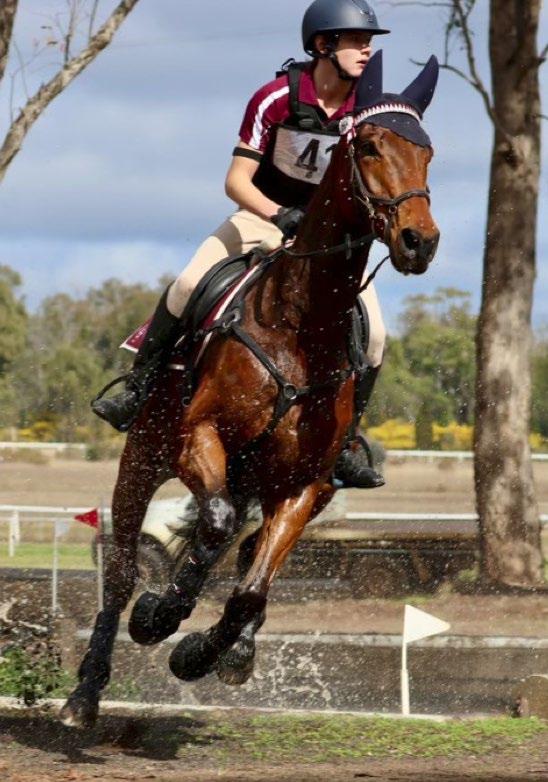
Photo Credit: Chris Miller Photography
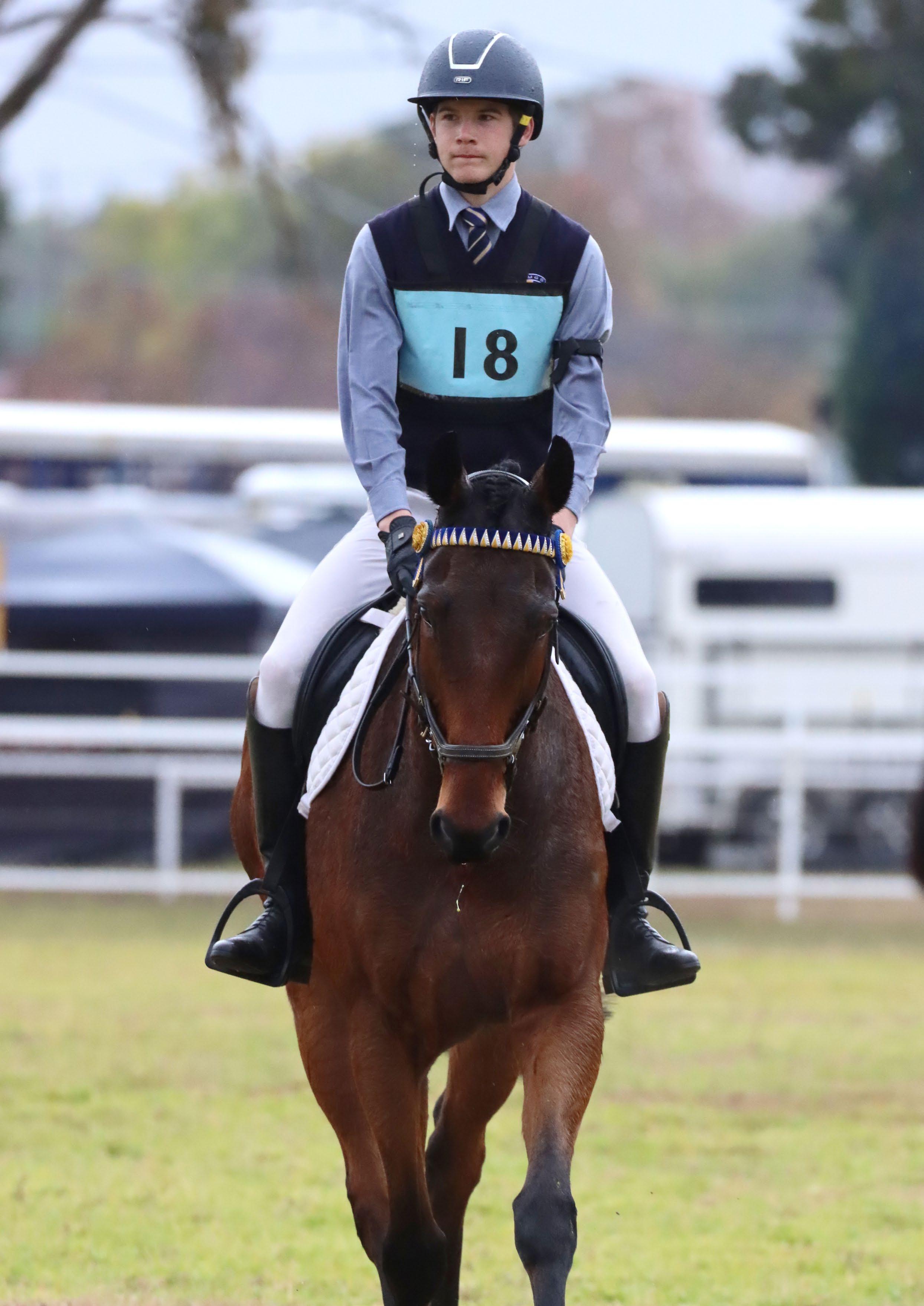
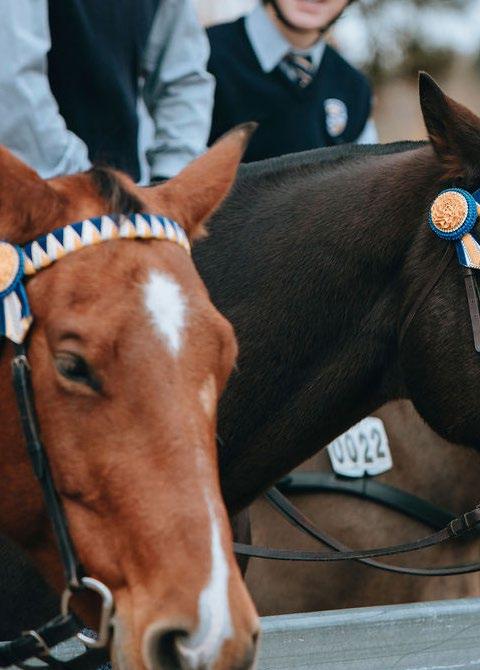
Handbook Snowy Mountains Grammar School
Photo Credit: Breanna A Photography
